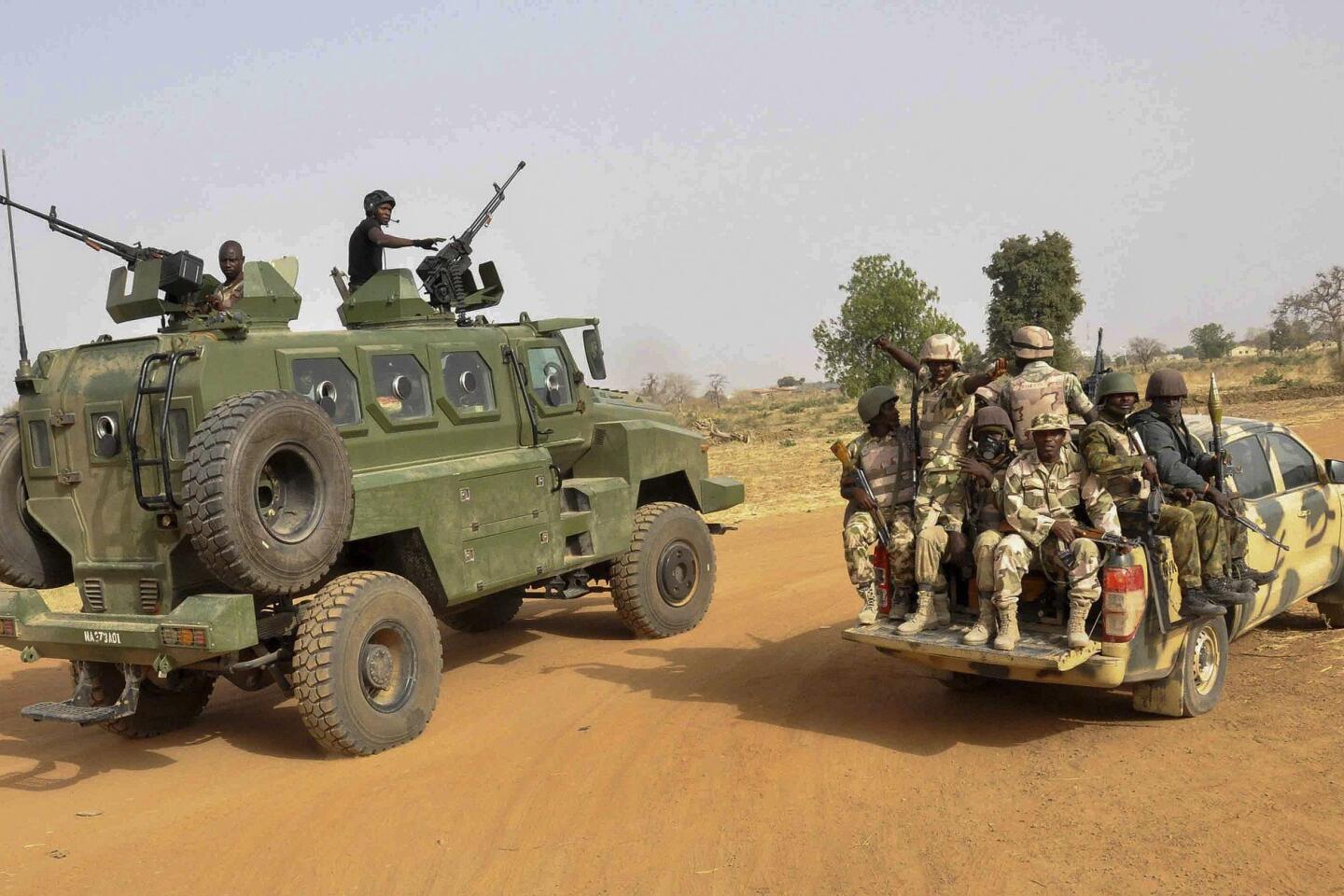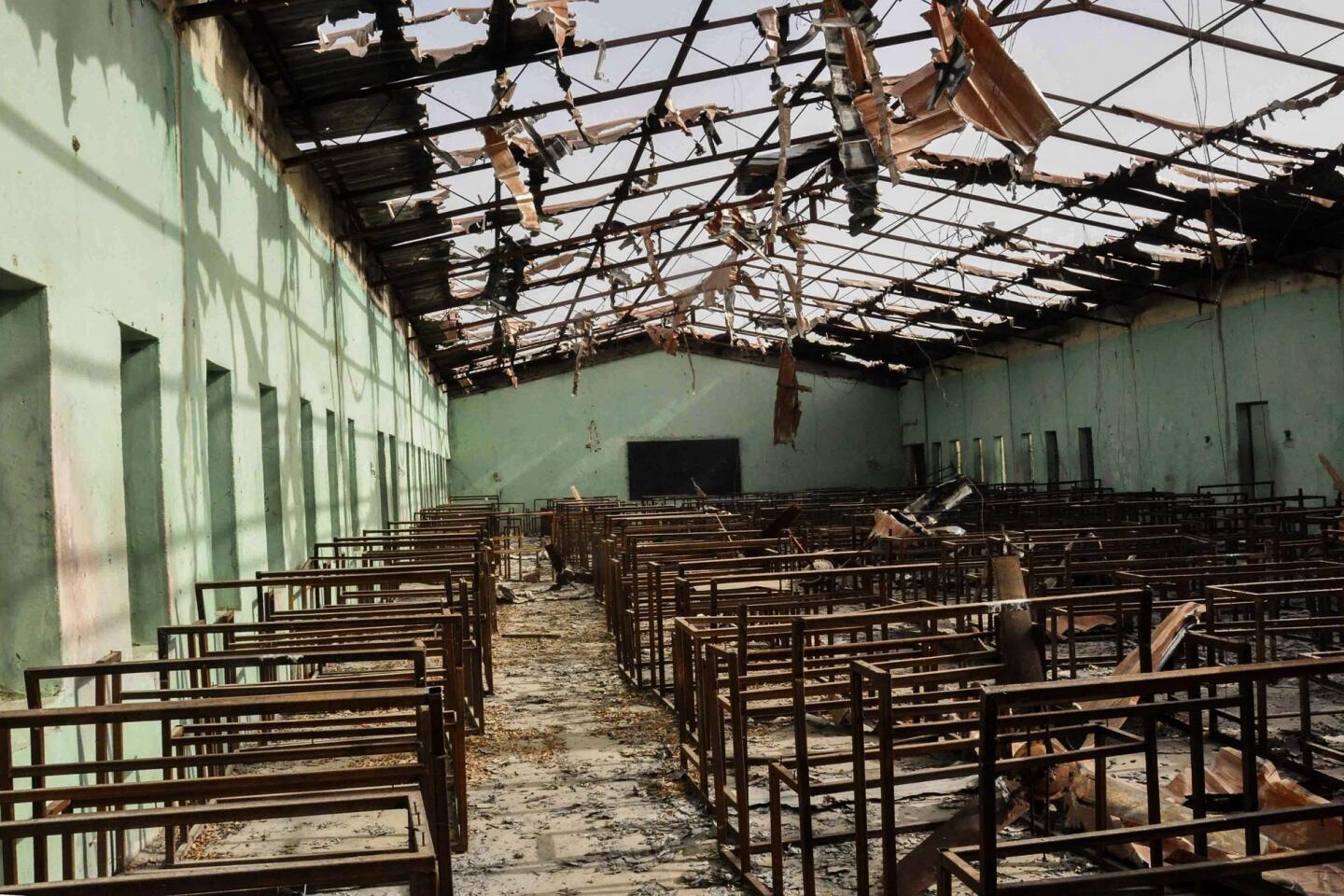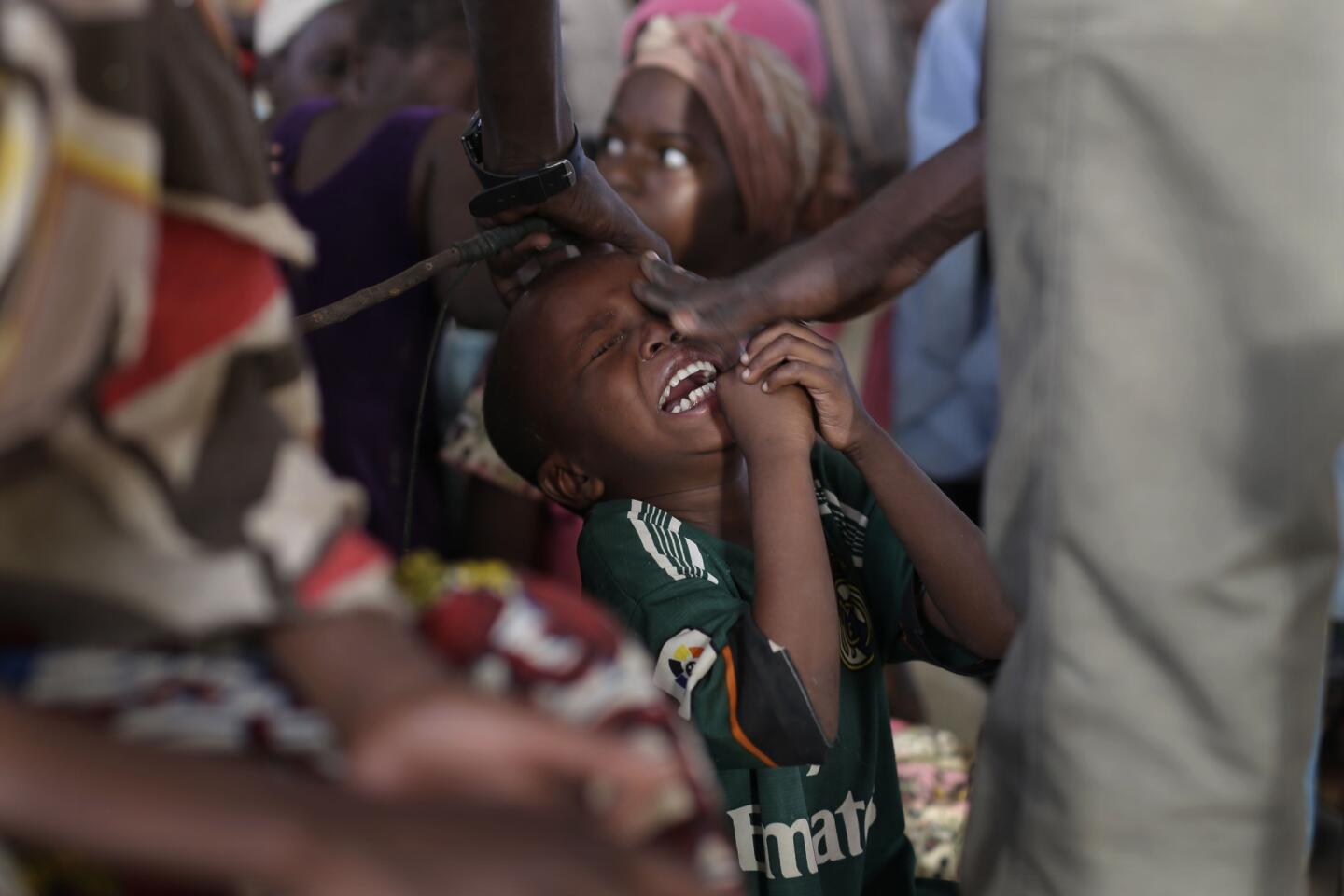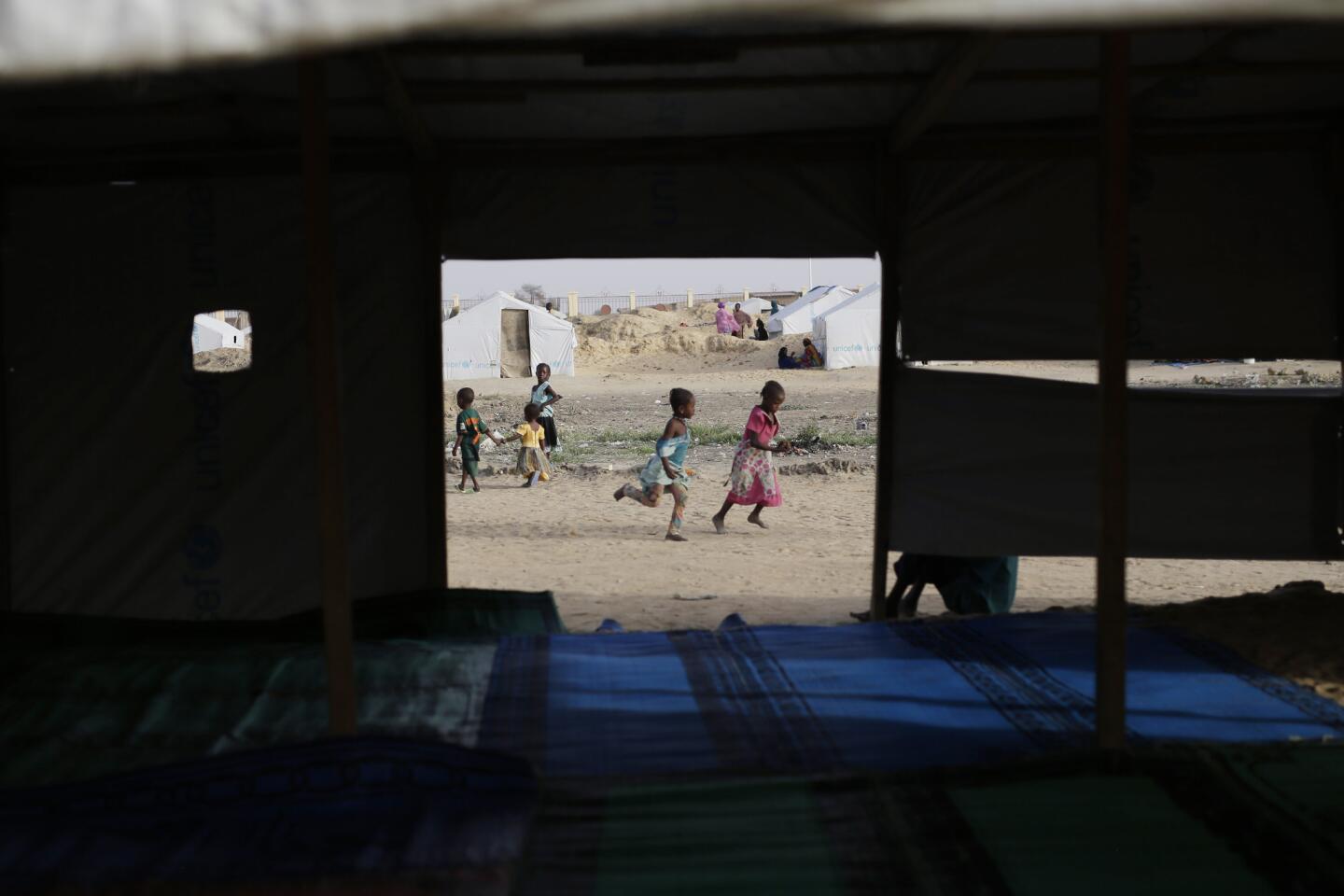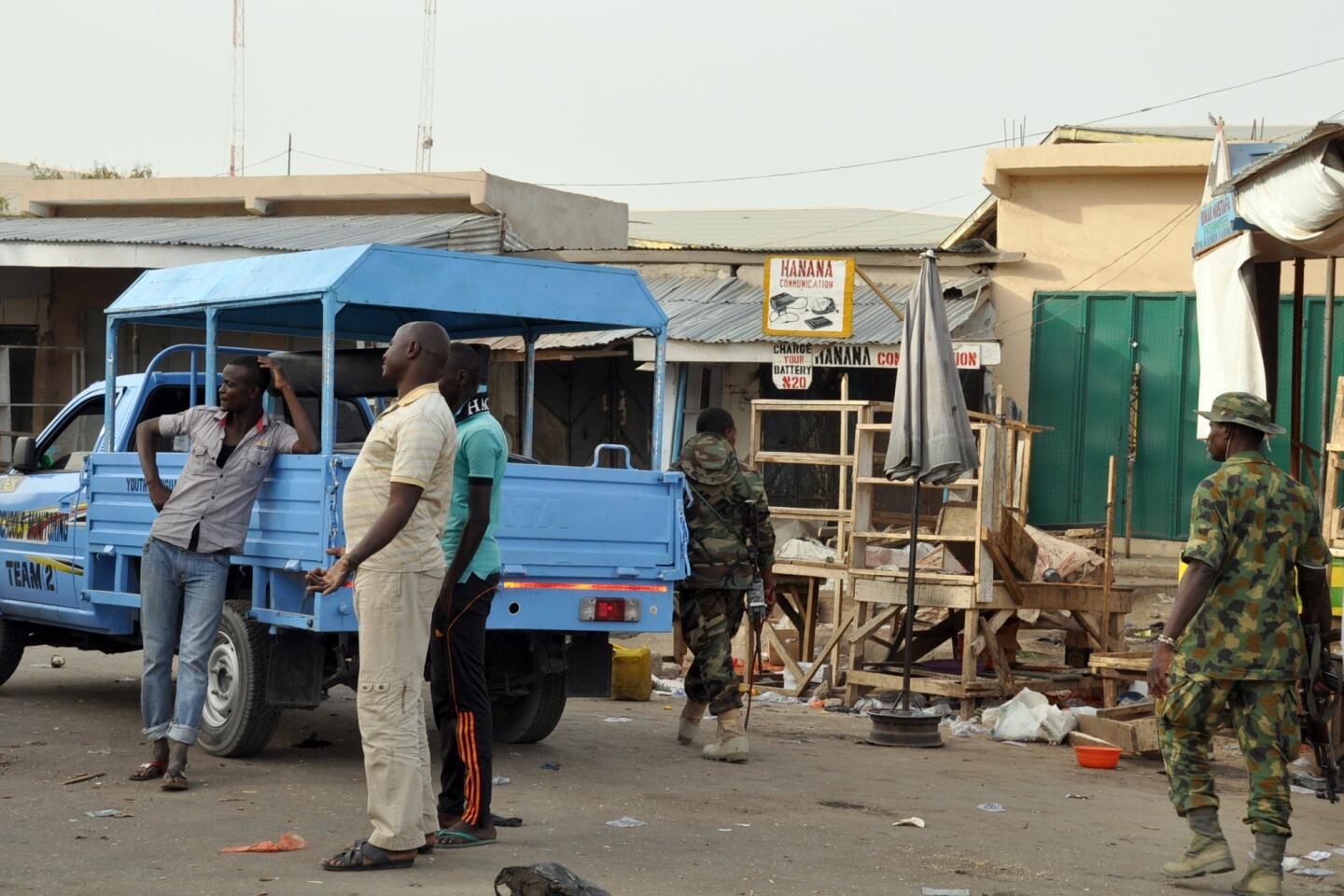Video appears to show some kidnapped Nigerian schoolgirls alive
- Share via
reporting from KANO, Nigeria — Two years after the kidnapping of 276 Nigerian schoolgirls, a video that appears to show them alive raised wrenching questions for desperate parents. The video, recorded last December, aired on CNN Thursday.
Why were only 15 of the kidnapped girls shown, when the only other video made public -- in May 2014 -- showed dozens of them? Where are the others? Have they been dispersed? How many are still alive?
Thousands of women and girls have been abducted in northeastern Nigeria by the terror group Boko Haram. Among them were 276 girls taken from Chibok school in northeastern Nigeria on April 14, 2014. Several dozen escaped but 219 are still missing, along with others from villages and towns across the region.
The Chibok kidnapping, which triggered the #BringBackOurGirls campaign on Twitter, is the second-largest, after a mass abduction in Damasak in 2014, when at least 400 people were abducted, mostly schoolchildren.
The December video was passed through an intermediary to the Nigerian government before CNN obtained it. It shows the girls standing in front of a blank wall wearing long, dark Islamic gowns with only their faces visible.
They gave their names, said they had been abducted from Chibok and stated the date the video was recorded: Dec. 25.
Ayuba Alamson, a guardian of four nieces, all kidnapped, recognized two of them in the video. “I was full of joy and had to fight back tears,” he said in a phone interview. “All the 15 girls were definitely among the Chibok schoolgirls and two of them are my nieces. They are cousins.”
“Seeing the 15 girls on the video has strengthened us as parents and guardians that our daughters are alive. It has also imbued us with hope that one day our daughters will be free. We now look up to the Nigerian government to use whatever powers and means to secure the release of our daughters whose abduction has shattered our lives,” Alamson said.
A mother of one of the kidnapped girls, Esther Yakubu, said the video renewed her hope. “My daughter is not among the girls in the video but seeing some of the girls in the video has given me more courage and faith that our girls are alive and one day we will be reunited with them. As a mother I will never stop hoping that my daughter will be returned to me some day.
“The video has indeed boosted our morale and increased our optimism to all time high,” she said in a phone interview.
But a senior government official, who declined to be named because of the sensitivity of the issue, dampened hopes that the video would lead to the girls’ release. He said the video was actually the third one received by the government, not the second.
The official said the government last July received a similar video “from some characters claiming to be Boko Haram representatives,” who turned out to be fakes. The “characters” demanded 1 million euros for 10 of the girls, he said.
“This shows that the girls are not kept in one place. They are being held in different places in the custody of various factions of the group. The government can’t afford to negotiate on a piecemeal basis with factions through dubious and unreliable sources,” he said.
The government “has been carefully studying” the December video, which was received in January, according to the official.
Boko Haram, a group consisting of various loose factions, last year pledged allegiance to Islamic State, but its violence has at times surpassed that group’s attacks. It has been under intense military pressure in recent months, driven from its strongholds, with militaries in Nigeria and Cameroon reporting several recent cases where hundreds of militants surrendered.
Ceasefires and agreements with Boko Haram on the release of the Chibok girls have been announced in the past, only to fail. In some cases, the intermediaries haven’t been genuine. Another problem is the difficulty in getting all factions of the extremist group to adhere to any deal.
Information Minister Lai Mohammed said on CNN that talks were being held with Boko Haram, but he was vague about details.
“We cannot ignore leads but of course many of these investigations cannot be disclosed openly because it could also endanger the negotiations,” he said.
Emmaneul Ogebe of the Education Must Continue Initiative, which advocates on behalf of children deprived of education in northeastern Nigeria, said in a statement Thursday that he was concerned Mohammed seemed “tentative and noncommittal” about whether talks were really taking place.
“It is quite disconcerting that 100 days after [the video’s] production, the government still claims it hasn’t authenticated it,” he added. He said the depiction of only 15 girls was another concern.
“This could imply dispersal, demise, cross-border trafficking or even lack of capacity to corral a large group given Boko Haram’s loss of territory.”
Hundreds of abducted girls, boys and women have been freed as military forces have advanced in recent months, but the children abducted from Chibok and Damasak remain missing.
One of the Chibok girls, identified only as “Saa,” escaped Boko Haram by jumping off a truck that was taking the captives away. She said in a statement that she recognized three of her classmates in the December video.
“The moment I saw them and recognized their faces, Saratu Ayuba, Jummai Mutah and Kwazigu Hamman, I started crying, with tears of joy rolling down from my eyes, thanking God for their lives,” she said in a statement on the Facebook page of the Education Must Continue Initiative.
Nigeria’s government never mounted the “prioritized, sophisticated and sustained rescue” effort required to find the girls, activist Oby Ezekwesili charged in an op-ed article in Canada’s Globe and Mail newspaper published Thursday.
“The previous government of Nigeria mismanaged the rescue plan for the schoolgirls from the start. In the early days after the abduction, it chose to ignore, deny, doubt and be cynical about the abduction,” she wrote.
Ezekwesili said the previous Nigerian government refused to cooperate with Western nations including the U.S., Canada, Britain and France, which offered help to locate the missing girls.
“A senior minister in a Western government later stated that ‘dealing with your government on the rescue of the girls was the single most frustrating, unsatisfactory and disappointing thing I have ever done in my life,’” she wrote.
Abubakar is a special correspondent. Times staff writer Dixon reported from Johannesburg.
ALSO
U.S. report paints bleak picture of human rights around the globe
There’s no doubt now that Zika virus causes rare birth defects, CDC says
President Obama visits CIA headquarters as U.S. steps up attacks against Islamic State
More to Read
Sign up for Essential California
The most important California stories and recommendations in your inbox every morning.
You may occasionally receive promotional content from the Los Angeles Times.
